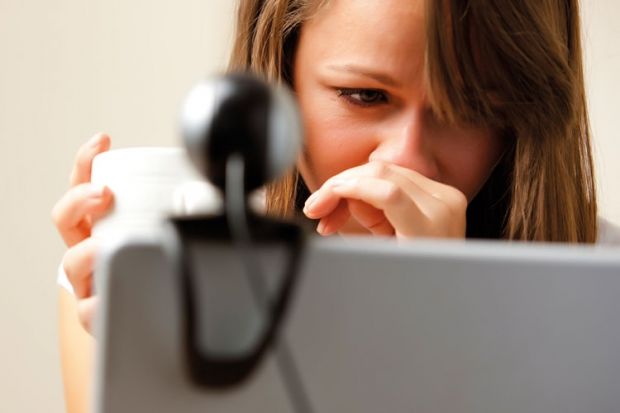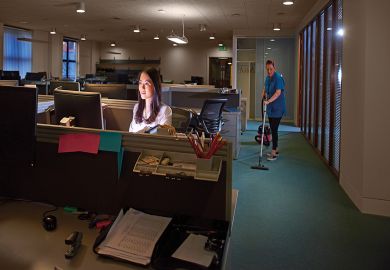Source: Corbis
Bully pulpit: many professionals have had unpleasant experiences online
Universities do not have effective systems to help staff who have been subjected to online bullying and sexual harassment.
This is the opinion of Sara Perry, lecturer in cultural heritage management at the University of York, who surveyed professionals about their experiences of being harassed online after she was herself targeted by colleagues in the higher education sector.
“In one case, I was sent a message about my appearance, which included…photographs [of a sexual nature] detailing the things that they would like to do to me if we were not in a professional context,” she told Times Higher Education.
“Subsequent to that I moved institutions and had the same thing happen – first with a person in the university and then with someone from a different university. Some of them were academics, others were…supporting my work.”
Further communications – sometimes with people with whom she was working directly and at others from individuals further afield – included a refusal to help with tasks unless Dr Perry “baked them a cake”, and being asked to “cuddle, or hold hands”. “It didn’t make any sense – it was crazy,” she said.
Last year, one of the online aggressors, whom Dr Perry knew “through academic channels” but was based at an overseas institution, began to send messages that were even more disturbing than those she had previously received.
“They were sending me private messages through social media that were totally inappropriate – about how I look, the way I should dress, what jewellery I should wear, [telling me] that they were drooling over my appearance,” Dr Perry said. “The messages were very aggressive.”
After that, Dr Perry, along with colleagues at the University of Southampton, set up a survey to investigate the extent of online bullying and harassment among professionals.
Some 400 people participated, about 60 per cent of whom worked in higher education. More than 40 per cent of the 400 said they had experienced at least one inappropriate or uncomfortable communication via digital media during their working life, with the figure almost identical among men (41.1 per cent) and women (41.2 per cent).
In four out of 10 cases, the unwelcome contact was made by someone the victims already knew offline, with just over a third of those who had been victimised (37 per cent) saying it had happened on five or more occasions.
About 30 per cent of the communications were defined by the researchers as “unprofessional/inappropriate”, with 26 per cent categorised as “sexual harassment”. Attacks on an individual’s professional or personal character accounted for 26 per cent of the abuses, while 6 per cent were categorised as “abusive/threatening”. The remaining 12 per cent were undefined. “The most disturbing finding was that the majority of people ignored what was going on and kept silent about it,” Dr Perry continued.
She was also concerned that academics were more at risk than other professions because of the “impact agenda”, which pressured them into building a public profile – often by cultivating a strong online identity.
“If your institution is requiring you to have an impact online, then they need to have mechanisms in place to keep you safe,” she added. “We found that they don’t have those mechanisms, or where they do, the onus is always on the individuals to do something themselves, such as confront the person, or delete their [own] online account.”
Register to continue
Why register?
- Registration is free and only takes a moment
- Once registered, you can read 3 articles a month
- Sign up for our newsletter
Subscribe
Or subscribe for unlimited access to:
- Unlimited access to news, views, insights & reviews
- Digital editions
- Digital access to THE’s university and college rankings analysis
Already registered or a current subscriber? Login




